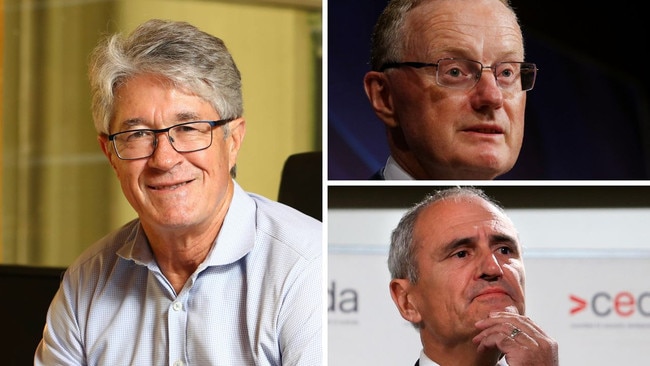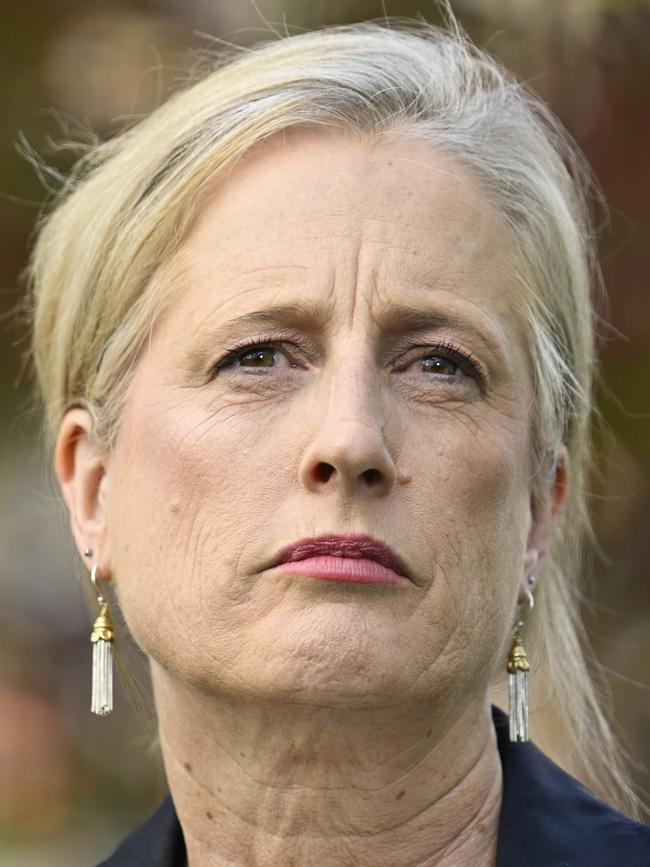Unrealised capital gains tax to hit green energy shift, says renewables pioneer Mike Fitzpatrick
Renewable energy infrastructure pioneer Mike Fitzpatrick warned that an unrealised capital gains tax would hurt the very investments that were needed to build the green energy revolution in Australia.

Anthony Albanese’s energy revolution will suffer a setback if Labor’s proposed tax on unrealised capital gains passes parliament as new investment in start-up green-technology companies will stall, the pioneer of renewable energy investment in Australia, Mike Fitzpatrick, has warned.
Labor is seeking to use its majority election win and the Greens’ depleted status in parliament to introduce an unrealised gains tax beginning with superannuation funds worth more than $3m, without indexation, but investors have warned that billions of dollars would stop flowing into riskier green start-ups.
As founder of renewable energy infrastructure firm Hastings Funds Management, Mr Fitzpatrick said he was very much against an unrealised capital gains tax and that it would hurt the very investments that were needed to build the green-energy revolution in Australia.
“The Labor Party has been at the forefront of financial reform in this country, from floating the dollar to starting superannuation, but unrealised capital gains tax is a disappointing initiative,” Mr Fitzpatrick told The Australian.
“It will be particularly tough on the start-ups in the technology and renewables space, and I would put renewables at the top of the list.”
Mr Fitzpatrick was AFL chairman for a decade and a director of Pacific Hydro and Global Renewables before founding 88 Green Ventures, which invests in the development and commercialisation of green technologies.
He was one of the leading candidates during the Rudd-Gillard Labor government to be chairman of the Clean Energy Finance Corporation. While reticent to hit out at Labor’s new tax he said he felt he had to join the chorus of prominent business people trying to stop it from proceeding.

This week the Reserve Bank’s immediate past governor Philip Lowe and former Treasury secretary Ken Henry told The Australian Labor’s unrealised gains tax was bad public policy and alternative measures should be taken to increase taxes on superannuation contributions and earnings that made the system fairer.
Labor is searching for more tax revenue and has booked billions of dollars into its budget from the expected unrealised gains tax.
Jim Chalmers did not respond to criticisms from Dr Lowe and Dr Henry on Thursday, leaving Finance Minister Katy Gallagher to dismiss them by saying Labor consulted on the tax years ago.
“We went through lots of different sets of consultation,” Senator Gallagher said.
“We’ve got, I think, the support to go forward with that. I’m hoping we can get them through the Senate.”
Assistant Treasurer Daniel Mulino has confirmed that up to 1.2 million people, or 10 per cent of taxpayers, would be hit by the tax over the next 30 years if the $3m threshold was not indexed.
Large superannuation funds are less likely to invest in renewable technology start-ups because of their size and the cost of assessing and managing such investments.
The $1.1 trillion self-managed superannuation funds system accounts for a significant proportion of the investment in renewable technology start-ups. Start-ups have low cash flows and volatile valuations so such investments would become less attractive if the investor were subject to unrealised capital gains.
Dominic Tayco, whose firm Thaddeus Martin Consulting helps green start-ups find capital, said the proposed superannuation tax changes were “deeply concerning. “The proposed superannuation changes threaten to disrupt this careful investment process, potentially forcing SMSFs into premature and distressed sales in markets lacking active secondary liquidity, thereby severely impacting funding continuity,” Mr Tayco said.
“By imposing a tax framework that could force SMSFs into premature liquidation of long-term, illiquid investments, the government risks undermining the very industries it has identified as essential to Australia’s future economic resilience and global competitiveness.
“These proposed changes directly contradict the government’s own stated objectives of encouraging superannuation funds to invest more heavily into infrastructure, critical technologies, and sustainability.”
Tech Council of Australia chief executive Damian Kassabgi said the tax was a clear risk for green technology start-ups. “One of the key areas in the tech start-up space is climate-related technologies,” Mr Kassabgi said. “They rely on venture capital with a significant portion of that coming from self-managed super funds which will be hampered by the tax on unrealised capital gains.”
The founder of start-up investor Make a Difference, Mac Christopherson said he feared the new tax would limit the number of green-technology businesses that would become available to invest in, because they wouldn’t have the early-stage support in the first place from self-managed super fund investors.
“Without SMSF capital flowing into early-stage ventures, many of these innovations – especially in critical areas like renewable energy and food waste – simply won’t get off the ground,” Mr Christopherson said.
“We’re preparing to invest in companies building virtual power plants, agritech and circular economy solutions that were only made possible through early SMSF backing.
“I’ve personally invested in start-ups through my SMSF, and if I’d known unrealised gains would be taxed, I would have seriously reconsidered. This change threatens to dry up one of the most important funding sources for innovation in Australia.”
Wilson Asset Management’s Geoff Wilson said a slump in investment for green-technology start-ups might awaken a crucial block of Greens senators to reconsider the unrealised component of Labor’s super tax changes.
“The Greens have the power in the Senate,” Mr Wilson said. “I’m sure they realise how detrimental taxing unrealised gains will be for new green renewables investments and businesses.
“I am very supportive of their desire for indexation. If Labor are serious in their claims for additional revenue then they should lower the cap to $2m indexed and remove taxing unrealised gains.”
CSL chairman Brian McNamee, who has helped found new technology companies, said there were dangers for start-ups across the whole economy, not just climate-related investments.
“Start-ups need people to give them capital and the self-managed superannuation funds are a big part of that,” Mr Wilson said. “The last thing we need to do is make it harder for start-ups. That’s where the new jobs in the economy come from.”
The Australian has previously reported that the first investor in Afterpay, Labor donor David Hancock, said he might not have made the investment under an unrealised capital gains tax regime.








To join the conversation, please log in. Don't have an account? Register
Join the conversation, you are commenting as Logout